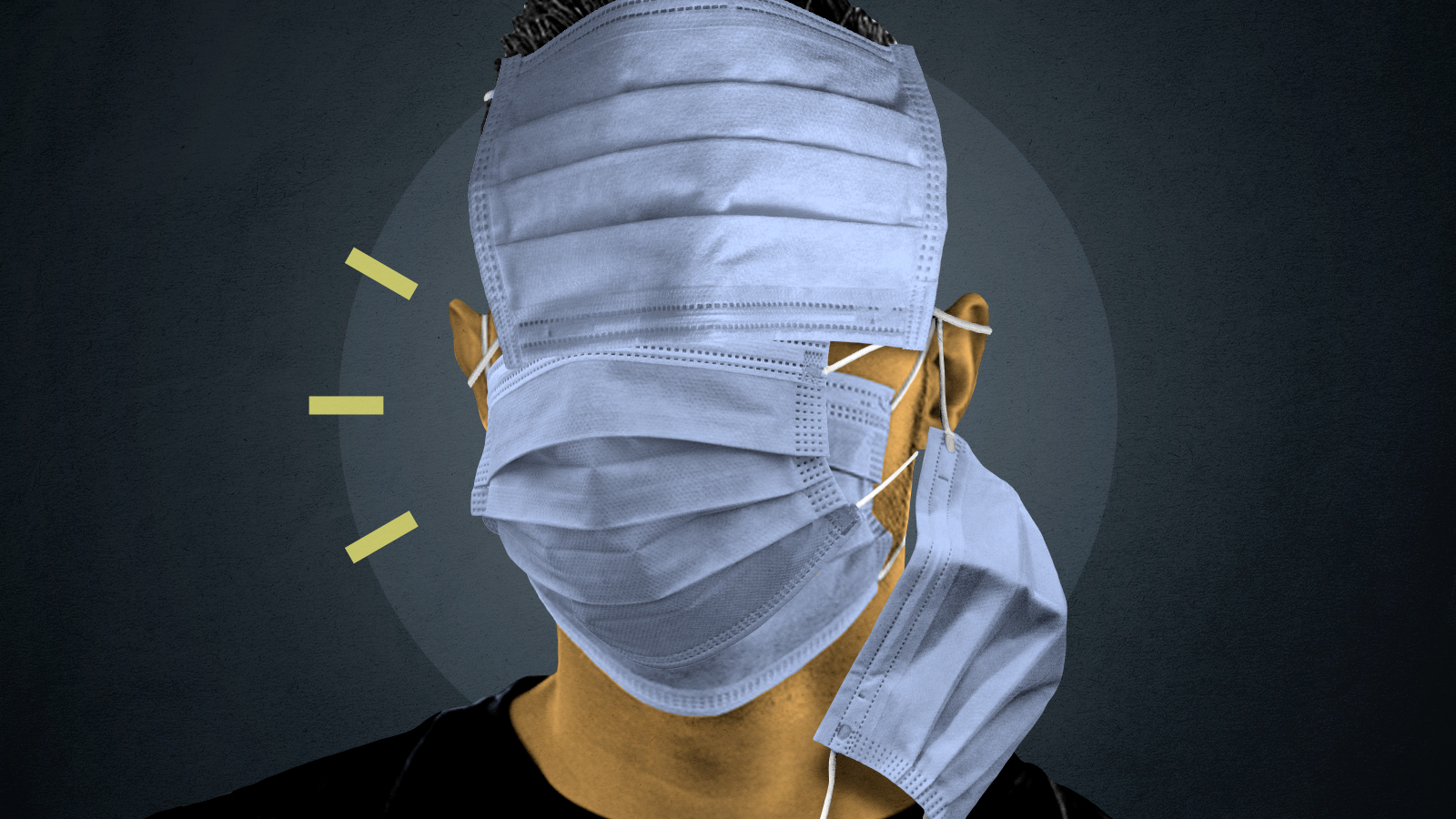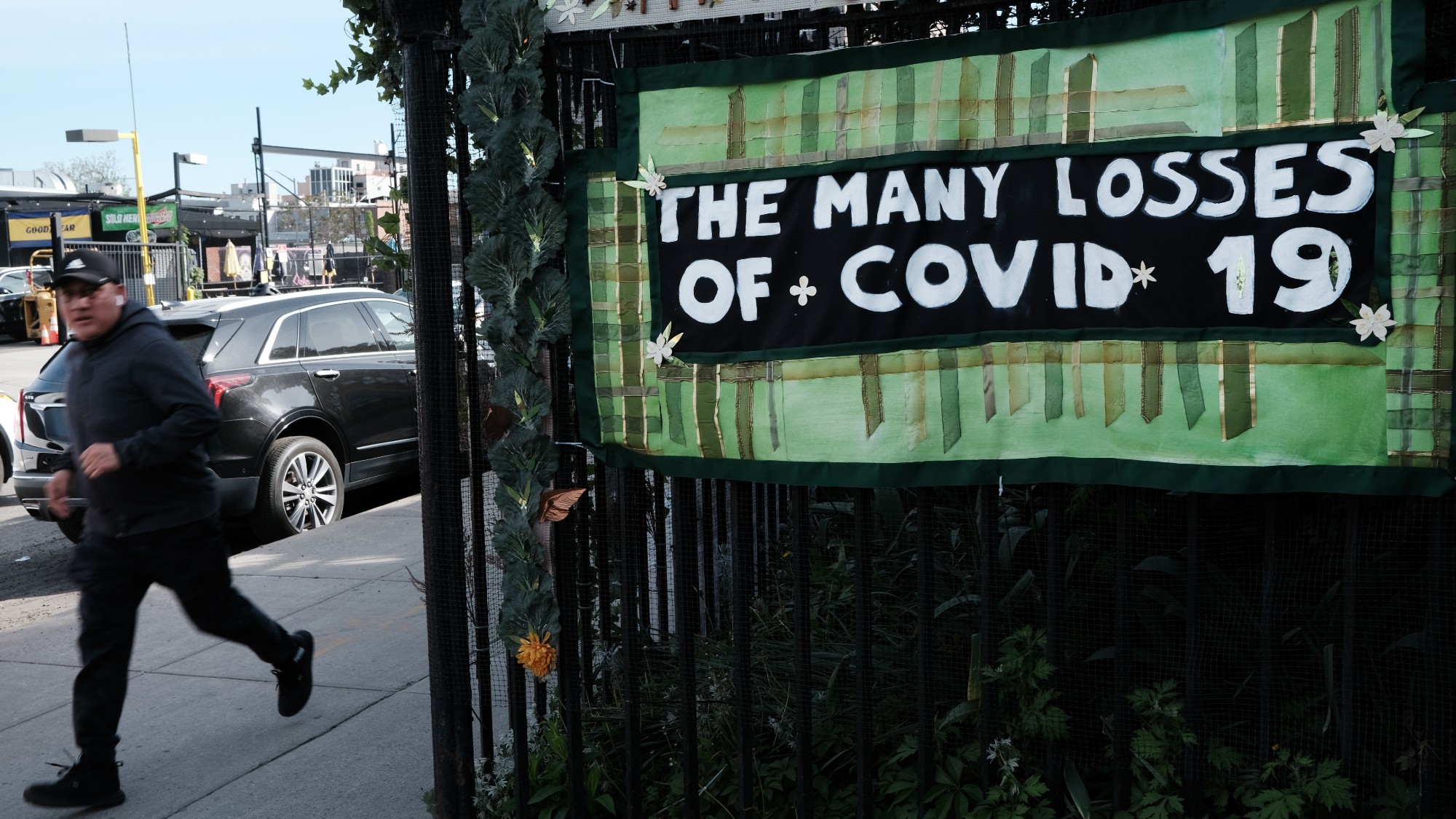COVID hawks are fighting a losing war
Our pandemic rules increasingly make no sense — and it's hurting public health


A free daily email with the biggest news stories of the day – and the best features from TheWeek.com
You are now subscribed
Your newsletter sign-up was successful
I spent about a week in October at the Austin Film Festival and Writers' Conference, attending panel discussions, round-tables, pitch competitions — and, of course, parties. Because there's still a pandemic going on, the festival imposed a number of rules: All attendees had to be either vaccinated or have tested negative for COVID-19 within a couple of days of the festival start, and in any indoor forum attendees had to be masked, unless they were eating or drinking.
But at parties everyone is continually drinking, and sometimes eating. So the same people who were going from panels where they were assiduously masked went to the bar where they were drinking and shouting without masks in close proximity.
Needless to say, from an epidemiological perspective, this is not a set of rules that makes any sense.
The Week
Escape your echo chamber. Get the facts behind the news, plus analysis from multiple perspectives.

Sign up for The Week's Free Newsletters
From our morning news briefing to a weekly Good News Newsletter, get the best of The Week delivered directly to your inbox.
From our morning news briefing to a weekly Good News Newsletter, get the best of The Week delivered directly to your inbox.
To live in COVID-conscious areas of the country is to be confronted, continually, with that kind of epidemiological bipolarity. The synagogue I attend mandates universal masking on top of a vaccination requirement for in-person attendance. Public schools require staff to be vaccinated and universal masking, including of young children. Theaters have rigorous testing regimens and complex rules to prevent viral transmission in rehearsal or on stage, and all patrons must be both vaccinated and masked. Meanwhile, people can go to nightclubs, bars, restaurants, and parties, socializing freely without masks or distancing.
What drives this dichotomy? Rather than fear of the virus itself, I think what overwhelmingly drives these rules is the fear of doing harm or of excluding anyone. If restrictions were lifted, there might be viral transmission in that location, and at the end of a chain of transmission someone might be hospitalized or die. Moreover, some people who are currently comfortable because of those restrictions might become uncomfortable, and feel unable to attend.
This view sounds generous, but it is myopic and profoundly destructive of public trust. Imposing restrictions that are more severe than the population's actual behavior may make people feel like they are doing something, but what they are doing accomplishes little or nothing to prevent deaths or hospitalizations — the legitimate goals of a public health strategy. But they can do harm — potentially a great deal of harm — to the institutions themselves, and to those who depend on them. And in the end, that damage does more harm to public well-being than the restrictions themselves could possibly ameliorate.
This is most obvious in the case of school closures and the continued policy of student masking. From as early as the spring of 2020, only a couple of months into the pandemic, it was clear that children were at minimal risk of serious consequences from COVID. The main risk in COVID was never to children but from children — that they would be part of a chain of transmission that could kill their grandparents.
A free daily email with the biggest news stories of the day – and the best features from TheWeek.com
That concern should be vastly reduced now that vaccines are widely available and over 85 percent of the 65+ population has been vaccinated. But in the summer of 2020, well before the vaccines were available, it was already apparent that schools should have been able to reopen for the 2020-2021 school year. Frequent testing, ventilation upgrades, and universal mask mandates made it possible to offer full-time, in-person instruction without supercharging the pandemic. But instead of putting those systems in place, many jurisdictions — particularly in COVID-conscious areas — simply kept schools closed.
That choice did harm — in some cases lasting harm. Across the board, students learned less and suffered psychologically from isolation and the disruption of their normal routine. It did the most harm to the prospects of students who already faced obstacles to academic success, whether due to sociological factors or individual disabilities, and thereby set back the cause of equity. And it encouraged those with the means and ability to seek other alternatives (many private and parochial schools remained open), thereby undermining popular support for public education. Rather than being weighed in the balance, these predictable harms were largely dismissed.
The political consequences, meanwhile, made themselves manifest last Tuesday, as the politics of education drove GOP victories in Virginia and elsewhere. While culture war issues dominated the public debate, those issues would not be getting nearly so much traction if parents were confident in the quality and commitment of those running the public schools. That confidence has been badly dented by the response to the pandemic, and further undermined by cautious foot-dragging even as widespread vaccination of adults has largely obviated the public health argument for any restrictions on children, in class or out.
It's not just schools where that confidence has dwindled, and institutions have suffered. Churches and synagogues have won the right in the courts to a "most-favored nation" status with respect to COVID restrictions: Pandemic-driven rules for religious venues can be no more severe than those imposed generally on non-religious ones. But this has left more COVID-conscious denominations in particular to decide for themselves how to manage their approach to the pandemic — which puts clergy in a particularly difficult position. As one Episcopal priest described it in a moving essay, her every decision is now second-guessed by parishioners with different risk-tolerance levels, all of whom expect the church to be a comfortable home. Meanwhile, her flock dwindles as people prefer other activities (or more engaging online churches) to being present on Sunday mornings.
Why, though, should her church be responsible for any pandemic-related rules? If her state allows bars to be open, why shouldn't she allow maskless singing in her church? Pandemic restrictions need to be universal and widely followed if the goal is to break the chains of transmission. If they aren't — and they aren't — then the restrictions have little public health rationale. They just reflect a refusal to confront the reality of a virus that has already become endemic. And that refusal is doing real harm to institutions like her church. The authority she has been handed — to protect her flock from COVID — is undermining her authority, while doing little or nothing for public health.
There's been discussions lately of off-ramping from restrictions and transitioning to a world of endemic COVID. But these discussions almost always take place in a bubble that presumes continued respect for the authorities doing this balancing act, when that respect has in fact eroded badly. The actual country we live in is not living socially-distanced life — not even in the bluest of blue states and cities. Hypocrisy is rampant, and it is perceived. Meanwhile, the pressure for continued restrictions is itself an expression of lack of confidence in vaccines — the only actual tool we have for lowering the ultimate toll of the virus — and feeds the perception among those already suspicious of the authorities that their real objective isn't controlling the pandemic but controlling the populace. It thereby contributes to the anti-vaccine sentiment that is the primary cause of America's continuing high death toll from COVID.
Like the old Afghan government, those in charge of public health have little practical ability to shape events. But they speak as if they are sovereign and in control. The longer they persist in that fiction, the more they hollow out what little authority they still have. The longer we persist with restrictions that are ineffective and not followed, rather than focusing on those actions that could actually make a permanent difference — like getting the adult vaccination rate up to a near-universal level — the more people are likely to tune out those authorities when and if restrictions really do become necessary again.
Noah Millman is a screenwriter and filmmaker, a political columnist and a critic. From 2012 through 2017 he was a senior editor and featured blogger at The American Conservative. His work has also appeared in The New York Times Book Review, Politico, USA Today, The New Republic, The Weekly Standard, Foreign Policy, Modern Age, First Things, and the Jewish Review of Books, among other publications. Noah lives in Brooklyn with his wife and son.
-
 The ‘ravenous’ demand for Cornish minerals
The ‘ravenous’ demand for Cornish mineralsUnder the Radar Growing need for critical minerals to power tech has intensified ‘appetite’ for lithium, which could be a ‘huge boon’ for local economy
-
 Why are election experts taking Trump’s midterm threats seriously?
Why are election experts taking Trump’s midterm threats seriously?IN THE SPOTLIGHT As the president muses about polling place deployments and a centralized electoral system aimed at one-party control, lawmakers are taking this administration at its word
-
 ‘Restaurateurs have become millionaires’
‘Restaurateurs have become millionaires’Instant Opinion Opinion, comment and editorials of the day
-
 The billionaires’ wealth tax: a catastrophe for California?
The billionaires’ wealth tax: a catastrophe for California?Talking Point Peter Thiel and Larry Page preparing to change state residency
-
 Bari Weiss’ ‘60 Minutes’ scandal is about more than one report
Bari Weiss’ ‘60 Minutes’ scandal is about more than one reportIN THE SPOTLIGHT By blocking an approved segment on a controversial prison holding US deportees in El Salvador, the editor-in-chief of CBS News has become the main story
-
 Has Zohran Mamdani shown the Democrats how to win again?
Has Zohran Mamdani shown the Democrats how to win again?Today’s Big Question New York City mayoral election touted as victory for left-wing populists but moderate centrist wins elsewhere present more complex path for Democratic Party
-
 Millions turn out for anti-Trump ‘No Kings’ rallies
Millions turn out for anti-Trump ‘No Kings’ ralliesSpeed Read An estimated 7 million people participated, 2 million more than at the first ‘No Kings’ protest in June
-
 Ghislaine Maxwell: angling for a Trump pardon
Ghislaine Maxwell: angling for a Trump pardonTalking Point Convicted sex trafficker's testimony could shed new light on president's links to Jeffrey Epstein
-
 The last words and final moments of 40 presidents
The last words and final moments of 40 presidentsThe Explainer Some are eloquent quotes worthy of the holders of the highest office in the nation, and others... aren't
-
 The JFK files: the truth at last?
The JFK files: the truth at last?In The Spotlight More than 64,000 previously classified documents relating the 1963 assassination of John F. Kennedy have been released by the Trump administration
-
 'There is a certain kind of strength in refusing to concede error'
'There is a certain kind of strength in refusing to concede error'instant opinion 'Opinion, comment and editorials of the day'
